‘Qui de si mais voldreit oir, Del bon Mareschel, de Johan’ – ‘To you who would hear more of the worthy John Marshal’ (Histoire de Guillaume le Mareschal, lines 120-121).
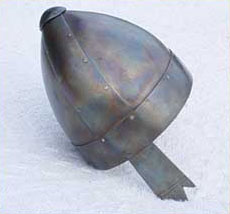
John Marshal was a formidable model for his son: astute, physically powerful, an easy companion in the royal chambers, and a cool warrior in the field…he was no coarse bandit and played the great game of politics with talent and perception…John Marshal was ‘a definitive man of standing in his son’s eyes.
John Marshal was probably born in the South West of England (most likely Wiltshire or Berkshire) around the year 1105. His father was a marshal at the court of King Henry I and we know his name was Gilbert Giffard. The appellation is a fairly common Norman one, meaning ‘chubby cheeks.’ John had a brother too, named William, who entered holy orders and had the living of the church of Cheddar in Somerset. He went on to become chancellor to the Empress Matilda. If there were any other siblings, they have not come down to us in history. We also don’t know who his mother was although one of the dubious genealogy sites online suggests that his mother was a de Venoix and for once it actually makes sense. Venoix is very close to Caen in the Calvados region of Normandy where many of William the Conqueror’s followers haled from, and there was a royal marshal called Robert de Venoix, so perhaps the families by association of work, formed a closer bond.
Gilbert the Marshal had estates provided for him to live off whilst he performed his duties at court. These included Tidworth in Wiltshire and Nettlecome in Somerset. They had estates in Devon and possessed seven and a half knights’ fees for scattered estates held of various landlords. Hamstead (now Hampstead Marshall) in Berkshire was probably a holding. There is a 13thC mention of the Marshal’s right to Hamstead and the Grange at Speen for service of the Marshal’s rod. Speen lies just outside Newbury on an area of strategically valuable high land overlooking the modern town.
The Marshal family were of the minor nobility but ambitious. They were middle ranking royal civil servants on the make. A Marshal’s duties were numerous, and since John followed his father into the position, he must have grown up learning the ropes. The word ‘Marshal’ comes from ‘Marescallus’ meaning ‘Horse slave’ and at one time they had been stable hands under the control of the Constable’s department. Although the office rose from these humble beginnings, the marshal’s work was much concerned with horses and transport and keeping order. The Marshals had their own department at court and there were several of them, although with a ‘Master Marshal’ in charge of all. This was a somewhat fluid position when John was growing up and there was a certain amount of jockeying for position within the ranks.
The Marshal’s duties included seeing that the stables were properly run and supplied and providing harness and mounts for those in need of them. The job also involved dealing with the kennels and the mews. It was the marshal’s task to provide carts for transport when the court was on the move. He had to find lodging for the household and keep order at the court. As a s symbol of the latter office, he carried the Marshal’s Rod. He had to ensure that the ‘verge’ was observed. A verge was a personal space between the king and any supplicant. Take a step too far and the Marshal’s rod would make sure you knew you had transgressed! The Marshal was in charge of the ushers who saw to it that only desireables got in to see the king. They were the club bouncers of their day so to speak – and I am sure sometimes not above taking bribes. Another aspect of the job was dealing with the ‘ladies of the night’ who serviced the court. The Marshal had to keep the working girls in line and regulate their activities. There were fines for unruly behaviour, and one suspects that this is another area where backhanders and insider dealing went on.
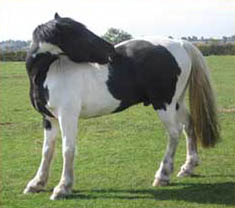
Each time a noble’s son was knighted at court, the marshal was entitled to a payment of a palfrey or a saddle. His daily wage was two shillings a day and he was entitled to bread, wine and candles whilst working at court. There were also ‘backhander’ perks from barons higher up the food chain who thought that a bit of glad-handing in the form of grants of land was useful in order to keep the king’s marshal sweet.
When John was in his mid twenties, he and his father had to fight for their right to be the Master Marshals of the court. Two of the other Marshals, Robert de Venoix and William de Hastings were claiming the post but John and his father were successful in their petition, which probably the form of a trial by combat. (Sidney Painter. William Marshal. Knight errant, Regent and Baron of England). John’s father died around 1129 or 1130 and John inherited his position at court, although he had to pay forty marks for the privilege. This included the office of ‘avener’ or provider of provender. To inherit his lands, he had to pay the death duty of £22 13s and 4d. Some time over the next few years, he married an heiress of modest worth with lands adjoining his own Wiltshire and Berkshire interests. She was called Aline Pipard and her main estate was at Clyffe Pypard in Wiltshire.
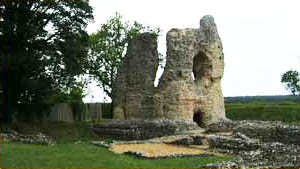
In 1139, the Empress came to England and made her bid to take the crown that she claimed Stephen had usurped. For whatever reason, Stephen suspected John Marshal of duplicity and besieged him at Marlborough. My personal opinion is that John had fallen foul of the factions at court who thought he had been receiving too many favours, and felt that he should be put in his place. He had no strong affinities at Stephen’s court and a man isolated was a man who could be picked off and brought down. I think John jumped before he was pushed (off the mortal coil). Speculation aside, what is known is that John swore for the Empress and adhered to her cause for the rest of the Civil War. His brother William joined her entourage as her chancellor.
Unfortunately for John, the Empress’s attempt to regain the throne was not plain sailing and to cut a long story short, she lost her advantage and while besieging the Bishop of Winchester at his palace of Wolvesely, she was almost captured. John was a few miles out of Winchester, dealing with a supply problem, when he heard that the troops of William D’Ypres, a Flemish mercenary in the pay of Stephen’s queen, were coming down the Andover road straight for him. If D’Ypres managed to break through, John knew that Winchester would be encircled and the Empress captured. John made his stand at Wherwell where there was a ford over the river Teste.
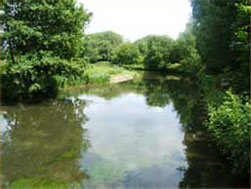
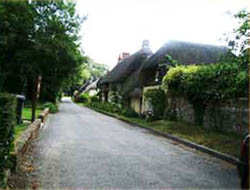
Above left: The River Teste at Wherwell. Right: Houses at Wherwell
He fought for as long as he could, but with D’Ypres’ numbers too great to withstand, he retreated into the nunnery and barricaded himself in. D’Ypres knew he couldn’t leave a man like John Marshal to create mayhem in his rear, so he ordered the nunnery to be burned along with the men inside it. There was mayhem and chaos. Some of the troops fled the burning church only to meet their end on the edges of the mercenary’s swords. John barricaded himself in the tower with another knight and refused to come out. When his companion feared for their lives and wanted to surrender, John told him that he would kill him with his own hands if he mentioned that word again. They stayed put, but John paid the price when molten lead from the church roof landed on his face and burned out his eye. Once D’Ypres’ force had moved on, John staggered from the church with his companion, and the two of them made their way to safety. This must have been something of a feat because that safety was twenty five miles away at Marlborough; they were on foot, and John had suffered a terrible facial injury. Nevertheless, they made it and once recovered, John set out to recoup and regroup.
John’s most powerful neighbour in the region was Walter of Salisbury, hereditary sheriff of Salisbury (nowadays called Old Sarum). When Walter died, his son William replaced him, but died not long after the battle of Wilton in 1143. The second son, Patrick became lord of Salisbury and he supported Stephen. Looking to curtail his forceful neighbour in the Kennet valley, Patrick took up arms against John. John ably defended himself, although he had fewer resources than Patrick, and even if often on the back foot, it was never defeat. Eventually Robert Earl of Gloucester stepped between the men. He offered Patrick an earldom if he would come over to the Empress and he suggested that John divorce his wife and marry Patrick’s sister to make peace between them. The men agreed and sometime between 1144 and 1145, John Marshal annulled his marriage to Aline and took Sybilla FitzWalter to wife. Aline was remarried to Gloucester’s uncle, a widower called Philip de Gay or de Gai. On the surface, John’s action may seem harsh, but that’s to judge him by the standards of our day, not his. He changed a ‘you will lose’ situation into a ‘you might win’ one by this strategy, and certainly stabilised life for himself and his dependents.
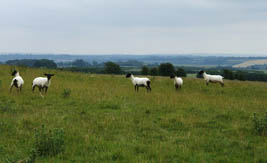
John and Sybilla swiftly began a second family. It’s perhaps telling that he only had two sons by his first wife in the course of fifteen years and six (and perhaps seven) offspring with Sybilla over the same period. The first was born within a year of the marriage and christened John for his father. The second, destined for fame and legend was William, born in either 1146 or 1147. We know for certain there were two daughters, Sybilla and Marguerite, and two more sons, Ancel and Henry. Henry went on to become bishop of Exeter and was probably born after Henry II had gained the throne. Ancel became a household knight in the service of his cousin, Rotrou, Count of Perche. During this time when his children were being born and growing up, John was very much around as a role model.
The fighting continued and the Empress’s position grew more desperate as her adherents either gave up or died. She lost her stalwart supporter Miles of Gloucester when he was accidentally shot by one of his own men whilst out hunting. Her half-brother Robert of Gloucester died, and her stalwart supporter Brian FitzCount retired to a monastery. The Empress herself departed England in 1148 and did not return, but her son Henry was waiting in the wings and growing up fast.
For John Marshal the period covered by the late 1140’s up to 1153 was a continuing dark time when he was involved in a war of slow grinding attrition. His lands were burned and ravaged by Eustace, the son of King Stephen and the best that John could manage was to grit his teeth and endure – which he did. He was known as a man of great cunning, a builder of castles ‘designed with wondrous skill’ and a man well able to attract men to his banner. Although a generous benefactor to the Church, he was still vilified by certain bishops and clergy. He was excommunicated for raiding church lands and forcing the church to answer in his secular court. He also made the church’s tenants build his castles for him, which did not go down well. ‘He built castles designed with wondrous skill, in the places that best suited him; the lands and possessions of the churches he brought under his own lordship, driving out the owners whatever order they might belong to.’ (Gesta Stephani). John seems to have taken the excommunication stoically and to have treated it as a hazard of the job so to speak.
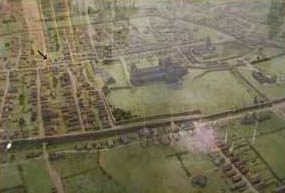
At some point in the early 1150’s John built a castle at Newbury. The whereabouts of this place is now unknown and there has been much speculation as to where it was. As far as I’m concerned, the answer is staring everyone in the face. It’s at Speen. (Here is my blog post on the subject). There’s also this article on my blog.
Be that as it may, John fortified a position in the Newbury area and held it for the Empress. In the summer of 1152 King Stephen besieged it on his way to try and take Wallingford. The first assault battered John’s troops badly but they didn’t give in. Stephen didn’t want to sit down to besiege it. I suspect he knew how hard John Marshal could stand and that he would sell the castle very dearly. John in his turn, knew he was in a dire situation and couldn’t hold out for much longer. He didn’t have the men and supplies necessary. He asked Stephen for time to gain honourable permission from the Empress to surrender the castle. Stephen agreed, but told John that he must provide hostages and pledges for his good word. John agreed to do so and handed over as one of them, his small son William, who would have been around five or six years old.
With the time he had been given, John set about stuffing his keep to the rafters with men and supplies. Why did he do this when he could have yielded? I suspect it was because he was buying time for Wallingford and for Henry FitzEmpress. Each day that he stood, was a day gained for the Angevin cause. John Marshal hadn’t backed down at Wherwell, where his stand had allowed the Empress to escape. He hadn’t backed down before the superior strength of Patrick of Salisbury, and he wasn’t going to back down now, even if it meant gambling with his son’s life.
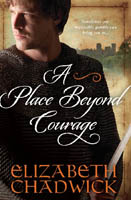
Callous father? Cool brinkman gambling with his son’s life? A man caught between a rock and a hard place and doing what he must to safeguard others? I leave that for readers of A Place Beyond Courage to decide.
I will say that there is far more going on under the surface than a cursory glance informs and that it is vital for anyone studying this incident to read it through the lens of medieval mindset. It’s not what’s on top that matters here, but what’s underneath. Stephen could not bring himself to hang the boy, although for a time William was the plaything victim of the royal camp as he was also threatened with being flung from a catapult and squashed whilst strapped to a hurdle intended to attack the castle gate. This is often not mentioned in the various secondary source narratives concerning the incident. From what I have garnered elsewhere, young squires and captive sons were frequently subjected to such torments – rather like the traditional ‘punishment details’ for youths at public school. Stephen took William into his household and John Marshal’s son seems to have settled well in his new life. He was happy and confident enough despite his ordeal to want to play a game with King Stephen, involving jousting with plaintain leaves. One wonders how such a chirpy, confident, secure little boy could have been born of such supposed parental indifference. A servant was sent to keep an eye on William, ‘because his family had great fears that he would come to harm’ (Histoire de Guillaume le Mareschal) but was caught in the act and chased away.
John’s castle at Newbury eventually fell to Stephen, but John had managed to buy that extra time for Wallingford. Stephen moved up to invest the latter and Henry came from Normandy to oppose him. Eventually a treaty was agreed whereby Stephen would keep the throne in his lifetime and Henry would inherit it on his death. Althought there were a few more skirmishes, the long civil war was in essence over.
Stephen died in 1154 and Henry FitzEmpress, at the age of twenty one, became King of England. Life slowly settled down. It is likely that John’s final son Henry was born at this time and named for the new power in the country. Henry set about restoring order. All adulterine castles were to be destroyed, and I suspect this is what happened to Newbury. Henry also took several castles back into his own power, including Marlborough. John was allowed to keep the manors of Wexcombe and Cherhill that Stephen had granted him, but only for his lifetime; it was not to be a hereditary right. John continued to serve Henry as his master marshal, but the King had his own new men to promote and John was of the ‘old regime’. Many of the gains made in the period of the war were lost, but John had still played his hand well and while his fortunes diminished, he nevertheless had created a fine platform from which his offspring could leap to make their own achievements.
William did so in spectacular fashion, going on to become Earl of Pembroke and regent of England. Henry, as aforementioned, was to become bishop of Exeter. More distant descendants of John Marshal include Robert the Bruce, Anne Boleyn, Elizabeth I, George Washington and Winston Churchill. John died in 1165, around the age of 60, which is as much as we know about his demise, although it may be telling that he made a grant to Bradenstoke Priory of half of the township of Easton, in the presence of his wife, two of earl Patrick’s chaplains, his chamberlain Osbert and Ralph the Physician. Was the physician there because he just happened to be handy and a man of learning, or was he there because of medical difficulties?John was buried at Bradenstoke Priory, the foundation of his marital relatives the Earls of Salisbury. His tomb and Sybilla’s have now been lost, but their bones still rest somewhere beneath the grass and tumbled stones of the ruins. [Further info on Bradenstoke Priory can be found here].
I can say without a doubt and from personal experience, that their spirits live on and John’s is a particularly vibrant one!